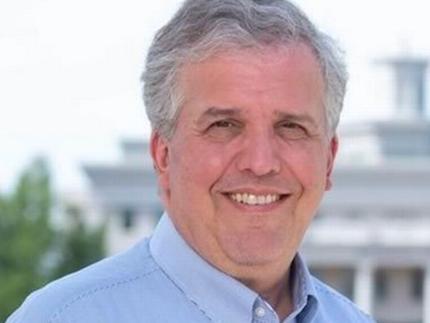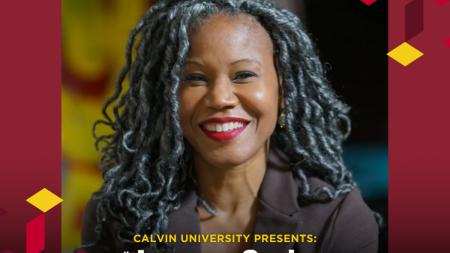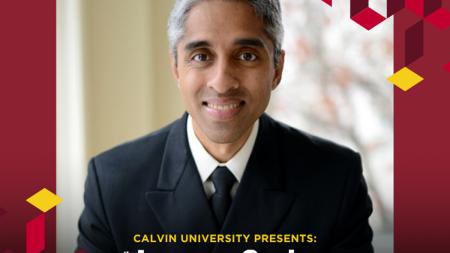Easter Hope and Pentecostal Power

The Great Resignation, in which record numbers of people are leaving their jobs during the COVID-19 pandemic, is a notable example of the way in which people no longer support their institutions, said L. Gregory Jones at Calvin University’s January Series this week.
Whether people are working in schools, factories, banks, religious institutions, or other enterprises, they are turning their backs on the organizations and businesses that should be undergirding and fueling the welfare of our society, added Jones, the newly named president of Belmont University in Nashville, Tenn.
Many people, regardless of their economic circumstances, are quitting their jobs. They want out; they are tired of doing what they see as meaningless work for institutions that put the bottom line at the top of their priorities, said Jones.
“We have lost trust with one another and our institutions. Across the board we are struggling because our institutions have failed and betrayed us,” said Jones, whose talk was titled “Trusting Institutions: Rediscovering the Power of Christianity’s Surprise.”
The 2022 January Series runs every weekday from January 10-28 from 12:30-1:30 p.m. (EST). People can join the event live at the Covenant Fine Arts Center on the campus of Calvin University or watch from one of more than 50 remote sites across the continent. In addition, each day’s presentation is livestreamed via the website and will be available for viewing afterward from 2 p.m. (EST) until midnight (PST) on that day.
One reason for the failure of our institutions and for our own unhappiness about the situation, said Jones, is our lack of imagination and our unwillingness to take on risks in a world filled with multiple and seemingly endless challenges.
Faced with a world reeling from COVID-19, political turmoil, climate change, and a range of other seemingly unsolvable challenges, many of us are like the ancient Israelites, said Jones.
Instead of being willing to venture into the promised land, they were gripped by fear of the unknown and wanted to return to Egypt – to a predictable place of slavery. And that is what many of us want to do – instead of facing the future, we want to hold on to things that are familiar to us. Or we want to hold on to nothing at all.
“Cynicism and mistrust abound today,” Jones said. “What we need is a trusting environment in which our imaginations can come alive, our relationships can grow, and our institutions can nourish us and lead to a life in which we flourish.”
Before coming to Belmont, Jones served as dean of Duke Divinity School and as provost and executive vice president of Baylor University. He is known for books on forgiveness, Christian leadership, and social innovation. His most recent book, coauthored with Andrew Hogue, is Navigating the Future: Traditioned Innovation for Wilder Seas.
As Christians, said Jones, we are in a good position to address the struggles we encounter and build for a better future. And we can do that by looking back to the many accomplishments of the early church – to a time when the church was growing and slowly transforming society by building and growing institutions.
“I suggest that Christians can rediscover the power of Christianity’s surprise as it grew in the early centuries of the church,” said Jones.
“That was a time when people were filled with Easter hope and pentecostal power. That was a time when people went out to offer new life and started many new institutions.”
Following the instructions of Jesus, whose resurrection helped to define and empower them, early Christians started institutions that provided health care, education, and relief from poverty, said Jones.
“They were inspired by the inbreaking and the reign of God. The early Christians saw that God was at work, and they were called to embrace orphans, widows, and the poor,” said Jones, an ordained Methodist minister.
“They created institutions that made life more abundant and transformational. Through innovation, they cultivated trust and established institutions that became a source and incubator of life.”
Jones called for Christianity to become “surprising again” and to lead the way forward, beyond cynicism, beyond despair, and beyond being just one more failing institution in society.
“As Christians, we are called to live into a new life as agents of hope wherever we go. We need to cultivate new institutions to bear witness to the power of God among us,” he said.
Can we rediscover what it means “to trust our institutions as well as to trust one another?” Jones asked.
“We should look at institutions as ecosystems that need to be tended, especially by people of faith who really can’t go back to Egypt but must cultivate an imagination that points to a healthy future,” he said.
Even in this time of turmoil, when many of us are discouraged and in despair, we must hang on to that Easter hope and open ourselves to the pentecostal power that once changed the world and can do so again, said Jones.
“We can’t afford any more of the Great Resignation, but we must bear witness to God and discover light that is really light and life that is really life,” he said.


